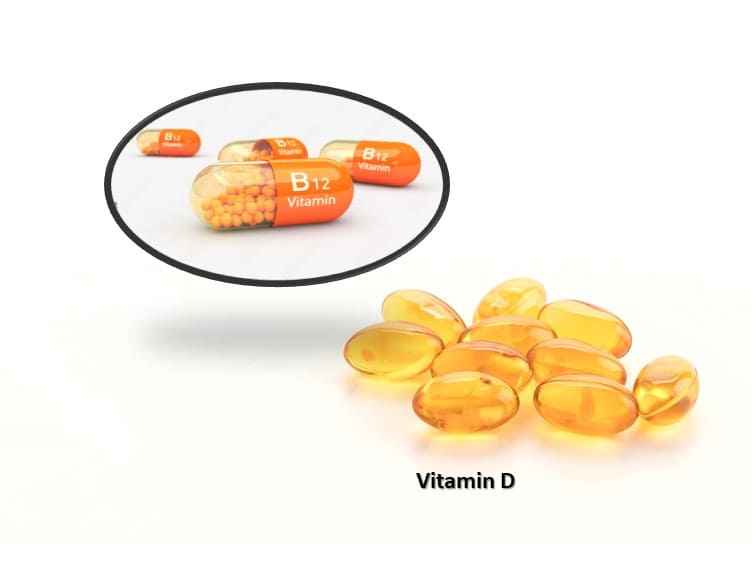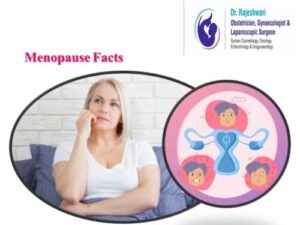Vitamin B12 and vitamin D are the important nutritional tools of the body – their deficiency may lead to a large number of health conditions ranging from weak bones and muscles to heart diseases. B12 is a B vitamin that plays a crucial role in blood formation – red blood cells synthesis, DNA and RNA production, as well as play a crucial role in the metabolism of carbohydrates, proteins, and lipids.
Vitamin D is necessary for bone strength since it aids the body’s absorption of calcium from food. Vitamin D3 insufficiency in childhood has long been linked to rickets, a condition in which bone tissue fails to mineralize effectively, resulting in skeletal abnormalities and soft bones. However, research is rapidly proving the relevance of vitamin D3 in preventing a variety of several other health conditions including some gynecological and obstetrics as well.
Vitamin B12 and Vitamin D
Vitamin D3 deficiency in women: Vitamin D helps in calcium absorption and thus increases bone strength. Its deficiency is associated with weak bones, osteomalacia, and osteoporosis. Deficiency of vitamin D may lead to secondary hyperparathyroidism – which in turn increases the risk of osteomalacia, osteopenia, osteoporosis, increased risk of bone loss, and bone fractures. Vitamin D3 deficiency causes indigestion, seasonal anxiety, immune disorders, dementia, acne, and itching in the majority of individuals. Deficiency of Vitamin D3 can also increase the risk of type 1 diabetes, asthma, hypertension, and high cholesterol, and heart disease.
Vitamin D Deficiency During Pregnancy
The deficiency of vitamin D during pregnancy is reported to be associated with an increased risk of preeclampsia, altered immune response, and the risk of preterm birth.
Vitamin D Deficiency and Gynaecological Health
Accumulating evidence suggests a link between low levels of vitamin D and the development of gynecological/obstetric conditions. Vitamin D levels deeply affect the risk of several diseases such as PCOS, endometriosis, and even breast and ovarian cancer.
Vitamin B12 deficiency
You are likely to have vitamin B12 deficiency if you:
Suffer from atrophic gastritis – which is characterized by a thinner stomach lining.
Have Pernicious anemia – It is a type of anemia that makes it difficult for your body to digest vitamin B12.
Having Crohn’s disease, celiac disease, growth of bacteria, or a parasite can all influence your small intestine.
Drink alcohol excessively. It can make it difficult for your body to digest nutrients and hinder you from consuming enough calories. Glossitis, or a swollen, tongue, is one symptom of a B12 deficiency.
Have Graves’ illness and lupus – These conditions are due to impaired immune system.
Even if you take adequate vitamin B12, you are most likely to have its deficiency when you have the above conditions.
You may likely have vitamin B12 deficiency if you take anti-acid medication for a long duration of time; take a vegetarian or vegan diet or have undergone weight loss surgery.
Symptoms of Vitamin B12 deficiency
- Weakness, exhaustion, or dizziness due to anemia
- Pale skin or pallor
- A well-knit tongue
- Constipation, diarrhea, loss of appetite, or gas are all symptoms of a digestive problem.
- Nerve issues such as numbness muscle cramps, and walking difficulties
- Loss of vision
- Tingling sensation in hands and feet
- Anxiety, memory loss, and changes in behavior are examples of mental health issues.
- Problems thinking and reasoning
- Irritability
- Decreased appetite and weight loss
Symptoms of Vitamin D3 deficiency in women
Though there are no specific symptoms associated with vitamin D deficiency, many people report the severity of joint pain, fatigue, bone pain, muscle weakness and muscle spasms, and also mood changes – anxiety and depression.
Consequences of vitamin D deficiency
Researchers have been actively shifting their focus towards the consequences of vitamin D deficiency – apart from studying its role in strengthening bones. They have found a link between vitamin D deficiency and a wide range of health issues such as cardiovascular disease, certain types of cancer, severe headaches, asthma, physical weakness, osteoporosis, muscle cramps, cognitive deterioration, inflammatory bowel disease, infections (frequent cough, cold and flu) and autoimmune disorders.
Factors that cause Vitamin D3 deficiency in women
- Residing at higher latitudes
- Advancing age
- Dark skin complexion
- Not getting enough sunlight exposure
- Lack of vitamin D in the diet
- Overweight or obesity
- Malabsorption
The risk of the following conditions increases with vitamin D3 Deficiency
- Type 1 diabetes in children
- Multiple sclerosis
- Lupus and rheumatoid arthritis in women
- Autoimmune Thyroid disease
- Vitamin D deficiency is seen in patients with schizophrenia, anxiety disorders, and depression
- Vitamin D deficiency is also associated with a high risk of high blood pressure, coronary artery disease, heart failure, and stroke
Sources of Vitamin B12
Vitamin B12 is found naturally in animal diets. It is also found in fortified vegetarian foods. Milk products, eggs, fish, meat, and chicken are all-natural animal sources of vitamin B12. The other options for vegetarians and vegans are fortified cereals, meals, and supplementation.
Sources of Vitamin D3
- Allow yourself 20 minutes in the sun to get sufficient vitamin D3 through your skin.
- To get maximum vitamin D through diet, breakfast should consist of nutritional foods such as milk, eggs, yogurt, orange juice among others.
- Mackerel, salmon, and cod are examples of foods that contain natural vitamin D3. Dairy products, fish oil, and eggs also contain calcium and vitamin D3.
- If milk is pure, it is the best source of calcium as well as vitamin D3.
Treatment for Vitamin B12 deficiency in women
You’ll need vitamin B12 shots at first if you have pernicious anemia or have difficulties digesting it. Furthermore, you have alternatives if you don’t consume animal products. If you are low in vitamin B12, you can adjust your diet to include vitamin B12-fortified cereals, a supplement, B12 shots, or can take a high dose of oral vitamin B12.
Treatment for Vitamin D3 deficiency in women
Because sunshine is the sole rich source of vitamin D, many individuals do not get enough sunlight exposure. Therefore, take vitamin D pills to boost your levels up again. The amount of vitamin D supplementation largely depends on the severity of the deficiency and your individual medical condition. For severe deficiency, you may need vitamin D3 shots. Your doctor will also prescribe oral supplements. Vitamin D3 tablets should be taken after having fat-rich meals to increase their absorption. Discuss with your doctor whether you need supplements on a daily or weekly basis.
Bottom line
In a nutshell, you should follow the recommendations of your healthcare provider regarding supplementation of vitamin B12 and vitamin D. As far as vitamin D intake is concerned, you get only 20% from the diet – which is again very selective and the remaining 80% is through Sunlight – which is the primary source of vitamin D. According to several research studies almost 90% of women get less exposure to sunlight on a regular basis – and therefore, they are at risk of vitamin D deficiency. The only option for them is to check their blood levels regularly and make adjustments to their supplementation doses. Furthermore, you can make adjustments to your daily supplementary intake based on your medical needs and seasonal variations.




